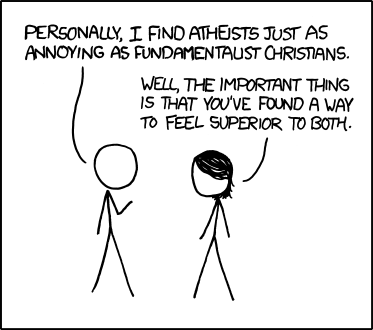Disclaimer: This post contains justified anger which has led to the use of what our culture considers to be obscenities. If such obscenities offend you more than the racism and sexism that led to such anger, I first must question your moral compass, but second I must warn you that this post is probably not for you and you should cease reading now.
I am just dismayed about the episode of Star Trek I recently watched. It's from The Original Series, titled "
The Omega Glory." I've been griping to my wife about the sexism in many episodes of the series, but I've been able to deal with that to where I haven't bothered writing any posts about it. This episode, however, was really bothersome. Not because it was horrible sexism* — it perhaps had less sexism** than an average episode — but horrible racism.
Part of the plot of the episode involves two tribes that are at war, the Yangs and the Kohns. It is revealed later in the episode that the Kohns are equivalent to communists and the Yangs to Yankees/Americans. To make things really fucked up, the Yangs have a flag that looks exactly like the American flag, they cite the Pledge of Allegiance, have the Bible and the U.S. Constitution. And this is supposed to be in a culture that was not tampered with (at least not until recently, too recent to have had such influence). Yet, just
two episodes before this, the crew encountered Nazis. In that episode, I recall Spock claiming the probability that this would happen on another planet on its own (without interference) would be near impossible***. And, in this case, it was a result of interference. Yet, in this episode,
Spock is not astonished at all. (Nor is anyone else for that matter.) So, it would seem that whoever wrote this episode (looking this up, it apparently was Gene Roddenberry himself) was (1) not the same person who wrote that prior episode (or they're really inconsistent in their writing, but, again, having looked this up, it was not the same writer) and (2) has a clear political agenda. What, exactly, that political agenda was is not clear to me, but I figure it had at least something to do with the Vietnam War.
Now, about that racism... I'll admit that I'm not entirely sure that all of the racism was either intended or the result of sheer ignorance; some of it may have just been a consequence of trying to reflect earth reality into the plot. (But intent is not magic.) The particular case I'm discussing here is how the Kohns/Communists appear Asian while the Yangs/Yankees are white (with some other raciest caveats I'll discuss in a bit). The problem? Remember that these are people that have evolved on their own separate from earth culture. There is an implication here that communist beliefs are genetically tied to Asian features. Then the Yangs, who love freedom so much that it is a sacred word, are, of course, white. Because nothing says you love freedom more than having white skin! Fucking. Sick. If there is any saving grace to this racism, it is that the Yangs are, especially early on, depicted as a savage race, so the white race is not necessarily viewed as being superior by any means. However, this can be explained by even more racism because the Yangs aren't entirely white. They're really more of a mix of Caucasian and Native American. The leader of the Yangs, for example, has the title of "chief" and his name is "Cloud Williams," a name that is quite clearly a mix of Native American and English.
There are numerous problems with this, the first being is the savage behavior of the Yangs could be seen as a result of their Native American heritage. Other problems with this deal with other parts of the plot, primarily with the Yangs trying to take what is supposedly their land back from the Kohns. For a story that is made to line up largely with earth history, this hugely misses the mark because in our history it is the Yankees who stole land from the Native Americans, not the communists! (I must note, though, that this part of the plot is made obvious through dialog to be a potential future for America, not part of the past. Still, it is a potential future that is made while ignoring the realities of the past.) This really seems insulting to the descendents of Native Americans to suggest that Europeans actually integrated peacefully with their ancestors. The best defense I can see for this is perhaps the writer was trying to suggest that this is the way things
should have been. That would at least be a bit better, but, if it were me, I'd suggest that the Europeans should have fucking stayed in Europe and worked on figuring out birth control instead (and freedom of speech and religion...whatever they needed to do to make staying in Europe more appealing). Getting back to the point, if this was the intended message, I didn't get it. Message. Not. Received. Seeing how other parts of the plot align with American history, deviations from that history need to be made clear or I find anyone is justified in concluding this as being the author's view of history.
I think that's the worst of the racism. The rest of what is on my mind involves the mixed messages about the USA. As stated, the Yangs have the Pledge of Allegiance and the Constitution. Reading
the comments of others, the Constitution has been slightly modified in oral presentation to start saying, "E Plebnista" instead of "We the people," a difference I had difficulty catching while watching the episode as the Yangs were talking in some sort of broken English when reciting these documents. — And what was the point of this? Was it to make it seem more ancient? — As stated by this other blogger, "Kirk resolves the great conflict by recognizing that E plebnista is actually a corruption of 'We the People' and giving the Yangs a good dose of high school civics." I find this blogger also has some insight when he states the following:
Gene Roddenberry’s here point is worth remembering: when the Constitution is made the subject of adoration, and when its key passages are converted into acontextualized proof texts, we end up with a ridiculous form of ancestor worship instead of a participatory democracy. We ignore the flesh-and-blood Founders by converting them into two-dimensional deities and their ideas about self-government into a prescriptive list of commandments. “We the people” becomes “E plebnista.”
I can see how he could arrive at this conclusion. However, a twist to this that I find a bit bizarre is that Kirk is familiar with these texts. Sure, Kirk is an American character, but if the concern is really about not making such documents a subject of adoration, a point I
strongly agree with, why does Kirk himself have the texts at least somewhat memorized? I don't have them memorized. I wouldn't want to memorize them. (Well, I do have the pledge memorized. It's rather short and my memorization is essentially from reciting it
years ago as a child.) I mean, if I'm going to devote time to memorizing the text of a document, I would think I'd have to only be a step away from worship. It's the ideas the Constitution contains that are more important than the particular words, which seems to be what Kirk is expressing, but I just can't get over this bit of inconsistency. There is also inconsistency with the portrayal of the American flag. It is highlighted at the end of the episode with some patriotic music playing. If the idea really is to be cautious about worship, then this episode is sending mixed messages. The best I can figure is that perhaps it was a message of "I love my country, but we can do better."
The final failed message I noticed is also near the very end where Kirk lectures the Yangs on the Constitution. There he's telling them that the ideas apply to
all people, including the Kohns. What exactly does that mean? The Yangs don't get it nor do I. I have
heard it said that the idea of the
Prime Directive where "humans should not influence or interfere with other races and peoples, was actually a snipe at American involvement in Vietnam." But one of the excuses our government gives — and I would suspect the government did so back then as well — for interfering is to bring democracy to those lands. Which could then be viewed as doing what Kirk advised!
In summary, this episode was a good example of how writers really need to be careful when putting political messages into their shows and a good example of how
not to do it!
*
As a note on that sexism, the main female character's part was pretty much there for male viewers to stare at, as she was cladly dressed, and as a plot device.
**
OK, since I may not otherwise end up talking about the sexism in Star Trek, so far the "greatest" moment of sexism I've seen was in the episode, "Wolf In The Fold." The background story to the plot, as I recall, is that Scotty was injured in some explosion. It sounded like it was accidental, but apparently it was the result of a mistake made by a woman. From this, Scotty developed a mistrust of women. Bones has Scotty on shore leave on a pleasure planet to get him over this. And...they take him to watch a belly dancer. (I wonder if the writer of this would have preferred a strip club if it could be shown on television.) The biggest problem with all of this is that Bones, the supposed medical doctor, seems to think it completely rational that Scotty would develop such a mistrust. So does Kirk. That's just bullshit. If a man had made the mistake, do we really believe Scotty would develop a mistrust of men? I don't. Scotty's rationale is sexist and it would only seem to make sense in a sexist environment. One would hope that the future portrayed in Star Trek would be mostly over sexism. Then again, the characters of the show are not over throwing punches to settle disputes as one of the first resorts, so why would I expect them to be over sexism?
***
And then just two episodes after this one, they discuss someone's "law" about parallel cultural development when they end up on a planet ruled by Romans. Horribly inconsistent writing! Not to mention a potential lack of imagination (or maybe lack of budget) with all these earth-themed episodes.




